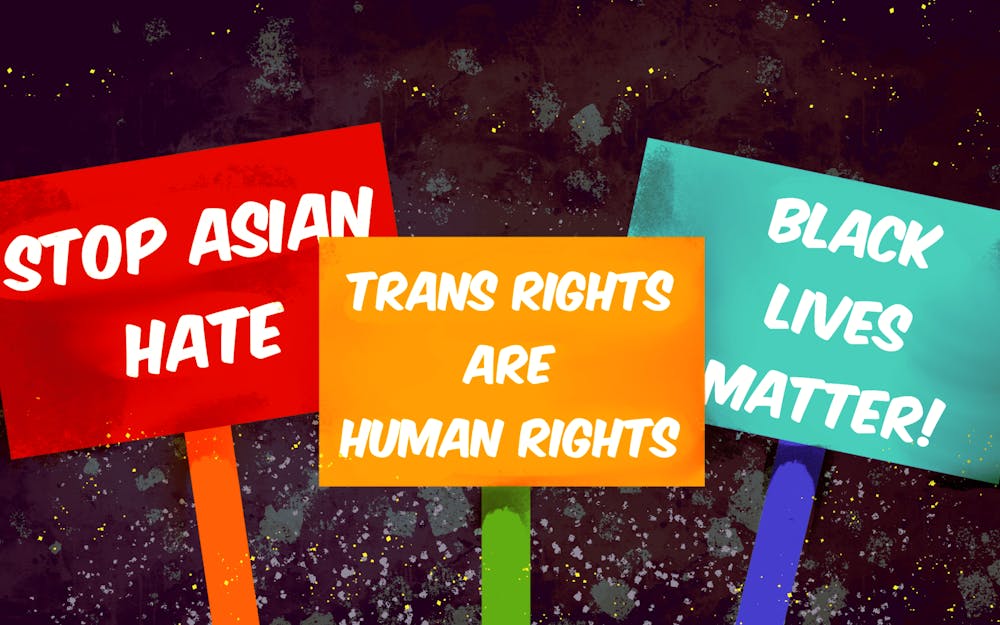I anticipate the headline for this column is going to ring obvious for those in Bloomington who identify with marginalized communities, but that’s very much the point.
Bloomington has a reputation for being a blue oasis in the middle of a red desert — that is, a liberal city in a state that otherwise leans conservative. But, in reality, Bloomington is something closer to a house of cards. After finishing a house of cards, it’s easy to admire it for its prettiness and stability — to pat yourself on the back for making it that way.
However, something occasionally comes along that knocks the house of cards over, revealing its fragile foundation and shattering the comfortable lies you told yourself.
On Jan. 11, an 18-year-old Asian IU student was stabbed on a bus less than a mile away from campus. According to the case’s affidavit, her alleged attacker told a detective she targeted the student because “it would be one less person to blow up our country.” The student — whose name hasn’t been released — received medical care, and her family said in a brief statement that she’s recovering.
[Related: Suspect in racially motivated bus stabbing seeking insanity defense]
Make no mistake: this crime is but one in a larger pattern of anti-Asian hatred both across the nation and here in our community. In 2016, Yue Zhang was stabbed in the back with a hatchet in Nashville, Indiana, by a man who was trying to bring about an “ethnic cleansing.” In 1999, IU graduate student Won-Joon Yoon was shot to death by a self-identified white supremacist.
My first instinct would be to call these hate crimes. However, legally speaking, that wouldn’t be correct. According to the Anti-Defamation League, Indiana is one of four states without a comprehensive hate crime law. Although Gov. Eric Holcomb signed a bill in 2019 that allows judges to impose harsher sentences for crimes involving bias, the ADL doesn’t recognize it as a true hate crime law because of its “uniquely and problematically broad language.” The bill also doesn’t explicitly list gender identity, age or sex as being protected categories.
Therefore, the alleged attacker on Jan. 11 was only charged with attempted murder and not a hate crime, despite being open about her racial motivations. The same can be said of the man who stabbed Yue Zhang.
But the problems we’ve been witnessing in this community extend past anti-Asian violence. Three days after this attack, on Jan. 14, Declan Farley — a transgender student — posted a TikTok discussing his experience with transphobia on his dorm floor. Farley, who said he transferred to Indiana because of its reputation as being a safe space for LGBTQ students, detailed the harassment he’s received from other students and the lack of action from faculty and staff.
Although he reported the incidents to his resident assistant as soon as they began at the beginning of the year, Farley said it wasn’t until he uploaded his TikTok, and it went viral, that a floor meeting was convened.
[Related: OPINION: Your trans friends need you now more than ever]
These events must serve as a reminder that bigotry in all its forms can and will happen anywhere, even those places — like Bloomington — we’ve romanticized into a sort of idyll. I return now to the beginning: this will all be glaringly obvious to those whose lived experience is made up, in part, by events like these and the anxiety they bring with them.
According to Data USA, IU is 65.9% white, and 34.4% of undergraduate students are white men. It’s easy to believe in Bloomington when, like me, you are part of the majority it works for. But it’s vitally important we open our eyes and stop pretending things are better than they actually are.
I can spend all day writing about how Indiana needs a comprehensive hate crime law. Or how IU must live up to its promise of being a safe space and protect its students. Or how we can’t tolerate these acts of hatred in our community. But there is more to do than just inform: these things and more we must start demanding — in the streets, in the voting booth, through words on paper — if we ever hope to build a Bloomington that works for all of us.
We cannot continue this way.
Joey Sills (he/him) is a sophomore studying journalism and political science.




